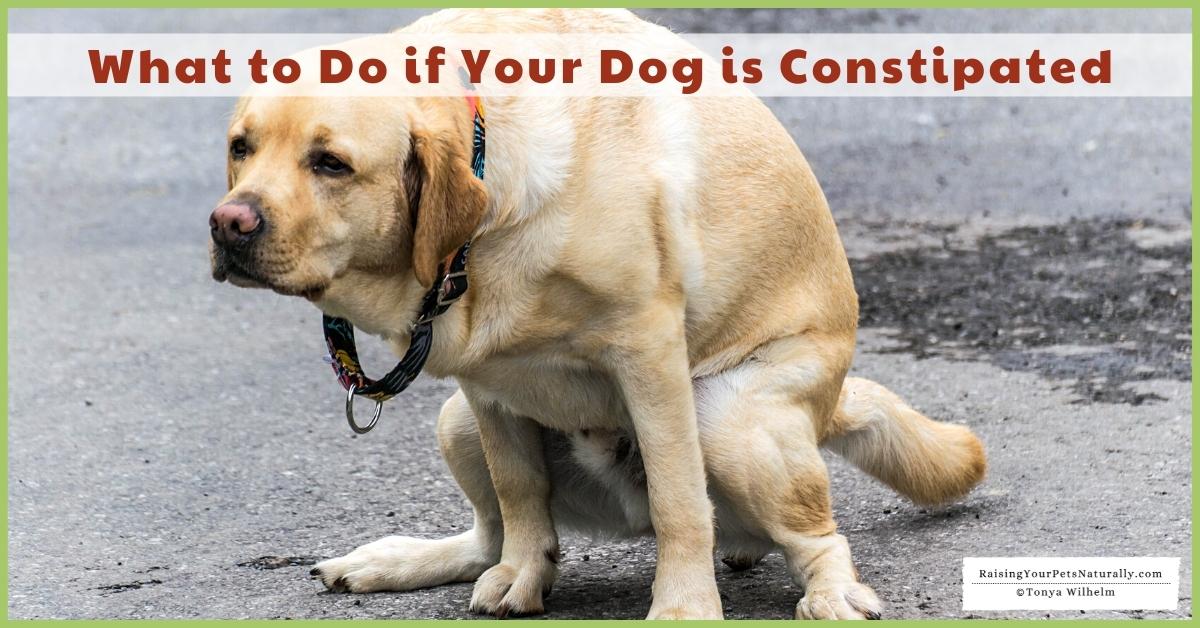Google Adsense—>

What to Do if Your Dog is Constipated

I know I’m not the only dog parent out there wondering what to do if my dog won’t poop. It’s all about the poop, is a common phrase in the dog community. A dog’s poop and pooping habits can be a key to your dog’s health.
Dexter has been on both sides of the fence, from dog diarrhea to dog constipation. I spoke with some leading veterinarians and pet care specialists for tips on what to do if your dog is constipated—when it’s an emergency, and when you can try natural home remedies you can give a dog for constipation.
Lisa Davila BS-Biomedical Science Hospital Manager at Aggieland Animal Health Center in College Station Texas, told me, “True constipation is actually uncommon in dogs, however, when it does occur, it can be a very uncomfortable condition.” She continued to offer this advice as to when to seek medical assistance, “If they are not vomiting, have a normal appetite, and have not eaten anything they should not have, it should be fine to wait 48 hours prior to making a vet appointment.”
Stephanie Lantry, DVM and veterinary expert with Airvet, agree and added, “If a dog is vomiting, has stopped eating completely, is straining, or you see blood around the rectum, then I would recommend going to an emergency hospital.”
Lisa also pointed out, “Dogs can also strain after having bad diarrhea, so it’s important that the dog parent monitor them carefully or they may mistake diarrhea for constipation. This happens A LOT!”
Common Conditions that May Cause a Dog to Become Constipated
I’m a why kind of gal. Knowing why a dog may not be able to poop can help me in trying to prevent constipation in the first place. Dr. Lantry provided me with these helpful scenarios. “Pain can lead to constipation. If a dog has a sore back or a sore leg and can’t comfortably get into the position to defecate, they may avoid going, which leads to a backup of the stool in the colon. As pets age, the muscles and nerves of the GI tract may become weaker, and they need some help in moving the stools through.”
I definitely can concur with Dr. Lantry’s statement. I have noticed when Dexter poops, he doesn’t hold the same pooping position as he did in his younger years. His bottom is almost touching the ground due to the lack of strength in his back end and core. As you know, I’m continually working on improving Dexter’s strength. Learn more on how to safely condition your dog here.
Dr. Lantry continued, “ Animals that are in kidney failure or other medical conditions that promote dehydration are much more likely to become constipated and sometimes even require enemas.”
Lisa added, “Ensuring that your pet is well hydrated and that they have a healthy fiber source in their diet can help prevent most problems as can holistic supplements like slippery elm.”
Dr. Lantry suggests psyllium powder and/or canned pumpkin as safe fiber and moisture choices. Dr. Lantry usually recommends at least a teaspoon of plain canned pumpkin per ten pounds of body weight.

Full or impacted anal glands can be another culprit leading to your dog not pooping. Dr. Lantry offered this insight, “When dogs are not able to express the anal glands on their own with defecation, they may become impacted and even infected. You don’t normally see the anal glands from the outside. They are located at the 4 o’clock and 8 o’clock positions. If they are bothering the dog by becoming too full, you may see your dog scooting on their rear end or licking excessively. Obese dogs are more likely also to have anal gland issues, so keeping your pet at a healthy weight can help this issue as well. If your dog’s rear end appears to be red or irritated in the anal area, soaking their bottom in a warm bath can sometimes help alleviate things to help them defecate. ” If this sounds like your dog, you can read more about keeping your dog’s anal glands healthy in this article.
Lisa offered this last piece of advice, “If your pet has a true motility disorder—motility disorders are abnormal muscle and nerve contractions that cause spasms or lack of motion anywhere along your pet’s gastrointestinal tract—your veterinarian may need to start them on routine medication to promote the proper function of the bowel. Acupuncture can be an excellent adjunct therapy to help keep your dog’s GI tract functioning well!”
The bottom line, although true constipation as we think of it may not be common in dogs, being a bit backed up is. 
Your questions or comments are welcome below.
Are you looking for even more ways to stay up to date with Raising Your Pets Naturally? Sign up for the newsletter for more tips and promotions. Don’t forget to be social and Like, Follow and Subscribe. Comments below are always welcome.
Facebook Twitter Pinterest Instagram YouTube
 |

If you found my blog helpful, please consider a small contribution. Dexter and I thank you! |
Google Adsense—>



